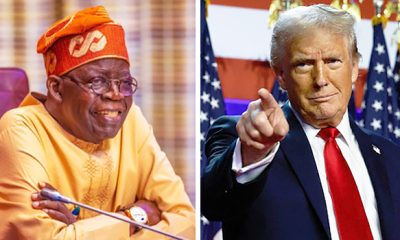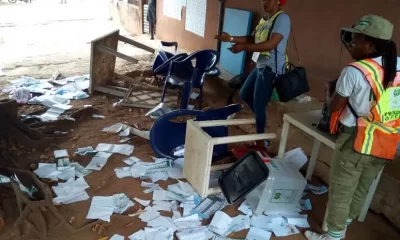BUSINESS
Fuel Scarcity will Soon Disappear, NMDPRA Assures Nigerians

The Nigerian Midstream and Downstream Petroleum Regulatory Authority (NMDPRA) has assured Nigerians that the prevailing fuel crisis ravaging various parts of the country would soon disappear.
Its Coordinator in Delta, Mr Victor Ohwodiasa, gave the assurance when he led a team of the regulatory authority on an unscheduled inspection visit to some petroleum depots at Ifiekporo, on Thursday evening and yesterday in Delta.
Ifiekporo Community is in Warri South Local Government area of Delta.
Ohwodiasa said that a lot of vessels laden with Premium Motor Spirit (PMS) known as Petrol were already coming into the state.
He said the regulatory authority would ensure that the vessels discharge products as quickly as possible.
“We will ensure that the depots receiving these products lift them out to the end users.
“By the time we have all the depots wet with PMS and they are lifting regularly, the looming scarcity we are experiencing will disappear,” Ohwodiasa said.
The agency’s coordinator said essence of the visit was to ensure that depots with the products dispensed to licenced retail outlets, eliminate middle men and also avoid diversion.
“Once we get our daily manifest, we send our men out to make sure that those trucks gets to their actual locations.
“There might be one or two infractions; we have apprehended about two persons for product diversion and they were made to face the full wrath of the law.
“As a regulatory authority, saddled with the responsibility of regulating the Midstream and Downstream of the Oil and Gas sector in Nigeria, we will continue to do what we need to do.
“This is to ensure that the products are available and adequately and fairly distributed within Delta and neighboring states,” he said.
Ohwodiasa said the NMDPRA would carry out intense routine surveillance, adding that it would sustain the tempo to ensure that the right things were done in the Midstream and Downstream sector of the oil and gas industry.
He, however, urged people to stop panic buying, assuring that the Federal Government was doing everything possible to ensure availability of petroleum products in the country, particularly during the Yuletide season and beyond.
Ohwodiasa added that NMDPRA would ensure that the products get to the consumers at the right price, quality and quantity.
Among the depots visited were: Matrix Energy Group, Pinnacle Oil and Gas Ltd. and AYM Shafa Ltd.
Speaking on behalf of the Matrix Energy, Mr Francis Ibe, the Terminal Manager, Matrix Energy, said that the PMS stock level at the Warri Depot was 14 million litres on Thursday.
Ibe said as at evening of Thursday, it had trucked out over four million litres.
“With what I am pushing out, I know it will not be enough. Before now on weekly basis, we were receiving 40 million litres of PMS, but at the moment, we barely received 40 million in two weeks. So you can see the difference.
“Fourty million litres in one week as against receiving one vessels in two weeks cannot solve the problem. There is a serious supply gap,” Ibe said.
Also, Mr Luke Nnajieze, the Depot Manager, Pinnacle Oil and Gas, Warri Depot, said that the current stock level of the company in Warri as at Thursday morning was
3.1 million litres of Premium Motor Spirit (PMS).
Nnajieze added that the Automated Gasoline Oil (AGO) was 2.9 million litres. At the moment, we are out of stock of Dual Purpose Kerosene (DPK). (NAN)
BUSINESS
CBN Revamps Agric Guarantee Scheme, Targets Smallholder Farmers

The Central Bank of Nigeria (CBN) has launched a major overhaul of the Agricultural Credit Guarantee Scheme Fund (ACGSF), unveiling a new strategic direction aimed at expanding credit access to smallholder farmers and accelerating national food security efforts.
Speaking in Abuja at the inauguration of the reconstituted ACGSF Board, CBN Governor, Olayemi Cardoso, described the revamp as “a new dawn” for agricultural financing.
He said the initiative reflects the Federal Government’s renewed commitment to reposition agriculture as a driver of inclusive growth, rural development, and economic diversification.Cardoso noted that the ACGSF-established in 1977-remains one of the country’s most impactful development finance tools.
Yet, despite employing nearly two-thirds of Nigeria’s labour force and contributing over 20 per cent to GDP, the agric sector continues to receive less than five per cent of total bank credit. This structural mismatch, he said, has stunted the potential of millions of farmers for decades.The CBN governor stressed that the agricultural landscape has evolved far beyond subsistence farming, now governed by integrated value chains, technology, climate risks and a growing agritech ecosystem. In line with these realities, he said the Scheme must transform into a dynamic, data-driven institution capable of supporting modern agriculture.
He highlighted the 2019 amendment that expanded the Scheme’s share capital from N3 billion to N50 billion and broadened its operational scope. One of the notable enhancements, he added, is the inclusion of farmers’ representatives on the new Board-an “inclusive and strategic” move to ensure policies are grounded in real sector needs.
Cardoso emphasised that the central objective of the revamp is to unlock affordable credit for smallholders who account for 90 per cent of the nation’s agricultural output but remain underserved due to limited collateral, poor credit history and weak access to financial services.
He urged the Board, chaired by Dr. Olusegun Oshin, to design products tailored to women, youth and other underserved groups while leveraging fintechs, microfinance banks and cooperatives to deliver innovative lending models. He also called for the deployment of technology-from satellite imagery to digital dashboards-to track loan utilisation and ensure measurable impact.
Dr. Oshin welcomed the reforms and advocated further expansion of the Fund to meet the scale of investment required for meaningful sectoral transformation.
| ReplyReply allForwardAdd reaction |
BUSINESS
Okonjo-Iweala, Others Urge Youths to Drive Reforms, Strengthen Civic Action

National leaders have challenged youths to lead Nigeria’s renewal, warning that meaningful change now depends on young citizens organizing, demanding accountability and driving sustained civic action.
They made the call on Wednesday night at the 15th anniversary of Enough is Enough Nigeria (EiE), held in Lagos, with the theme “Footprints and Frontlines”.
EiE is a civil society organisation advocating for accountable governance and citizen participation.
In a virtual keynote address, Director-General of the World Trade Organisation (WTO), Dr Ngozi Okonjo-Iweala, urged young Nigerians to lead change with courage and conviction.
She recalled her 2010 message to youths, saying it remained relevant.
“Do not wait and watch. Do not ask for permission. Get up, organise and make a difference,” she said.
Okonjo-Iweala noted that with 70 per cent of Nigeria’s population under 30, young people hold huge influence in shaping the country’s direction.
She urged them to use their numbers constructively while confronting persistent challenges such as unemployment and poor access to capital.
She praised EiE’s “Office of the Citizen” initiative for empowering communities to demand transparency and improved public services, adding that civic pressure was crucial for reform.
“Real change depends on organised, determined and courageous young citizens,” she said.
In his remarks, Emir of Kano and former Central Bank Governor, Mohammad Sanusi, said rebuilding Nigeria required honesty and collective responsibility.
“As citizens, we must remember this nation belongs to us. We have done enough damage. Enough is enough, we need to stop,”he said.
Sanusi said Nigeria had repeatedly missed development opportunities because public office was often treated as personal property.
He called for a shared national vision that transcends ethnicity, religion and political interest.
Bishop Matthew Kukah of the Catholic Diocese of Sokoto commended EiE for its resilience in advancing social justice and called on Nigerians, especially the youth, to persist in the struggle for a fair society.
“The journey to justice and fairness has no finish line.
Let us remain relentless in building a Nigeria that is just, equitable and bigger than all of us,” Kukah added.
Former Minister of Communication Technology, Mrs Omobola Johnson, emphasised collaborative effort in nation-building, saying development required hard work, sacrifice and citizens’ willingness to contribute their “time, talents and treasures.”
Executive Director of EiE, Yemi Adamolekun, said Nigeria continued to underperform because citizens were not demanding enough from leaders.
She urged Nigerians not to detach their personal progress from the fate of the country.
She said, “Whatever industry we work in, if Nigeria becomes a failed state, we will all suffer. Silence is not an option. Evil is amplified when good people stay silent.”
After highlighting EiE’s milestones over the past 15 years, Adamolekun announced 36-year-old Mrs Ufuoma Nnamdi-Udeh as the organisation’s new Executive Director.
The anniversary also featured the relaunch of Footprints: Past, Present, Future (2nd Edition), compiled by EiE and forwarded by the late diplomat Dr Christopher Kolade, in whose honour the event was partly dedicated.
Attendees also watched the premiere of One Voice, Many Echoes, a short film featuring archival footage from the 1993 election annulment protests, the 2010 Enough is Enough marches and the 2020 EndSARS demonstrations.
BUSINESS
EFCC Seeks Stronger Alliance with CSOs, Media in Anti-corruption Fight

The Economic and Financial Crimes Commission (EFCC) has called for deeper collaboration with Civil Society Organisations (CSOs) and the media in the fight against corruption, describing both groups as “critical drivers of national change.”
Acting Zonal Director of the EFCC, Kaduna Zonal Directorate, Bawa Usman Kaltungo, made the call on Thursday in Kaduna at a one-day sensitisation workshop for journalists and CSOs.
Kaltungo, who spoke on behalf of the EFCC Chairman, Ola Olukoyede, said the workshop was organised to strengthen cooperation between the commission and key stakeholders whose roles remain vital to public accountability and national integrity.
According to him, CSOs serve as the conscience of society and a bridge between citizens and government, while journalists use the “powerful pen” to shape public opinion and expose wrongdoing.
“Together, you are indispensable allies in safeguarding our economy and our collective future,” he said.
Kaltungo stated that the EFCC had benefited significantly from intelligence and information shared by CSOs and the media, which had helped expose suspicious financial transactions, abuses of office and systemic fraud.
“Our fight against corruption is not a solo mission. It requires synergy, trust and shared intelligence,” he said, urging the participants to use the workshop as a platform for open dialogue and strengthened collaboration.
Kaltungo commended the EFCC Public Affairs Department for organising the programme and formally declared the workshop open.
Earlier, Head of Public Affairs, EFCC Kaduna Zonal Directorate, Zainab Ahmed, outlined the objectives of the workshop, describing CSOs and journalists as the Commission’s “most valued stakeholders.”
She said the workshop was designed to deepen understanding of the legal and practical processes involved in prosecuting financial crimes, emerging threats in the digital space, and the preventive responsibilities of non-state actors.
“Our goal is to ensure all participants leave better informed, better connected, and better equipped to play their respective roles,” she said.
A presentation by the Head of Legal and Prosecution, Nasiru Salele, took participants through key issues in financial crime prosecution, including levels of involvement, evidence assessment and investigation procedures.
Salele identified challenges affecting prosecution, such as uncooperative judges and frequent transfers of Federal High Court judges.
He also highlighted advancements in EFCC investigations, including the use of AI tools and strengthened international cooperation.
Another session, led by Ayukor Ovirororo of the Procurement Fraud Section, focused on cryptocurrency-related crime. He explained how criminals store, move and launder crypto assets through centralized and decentralized exchanges.
Ovirororo warned that while cryptocurrency offers economic opportunities, it also poses national financial risks, citing recent high-profile cases as examples of unregulated digital operations escalating into major threats.
The final session, presented by Tony Orilade, Head of Public Interface at the EFCC Headquarters, centred on the preventive roles of CSOs and the media.
He emphasised the impact of investigative journalism, policy advocacy, public awareness campaigns and monitoring of government activities.
Orilade added that CSOs also provide safe platforms for whistle-blowers and play a significant role in shaping stronger anti-corruption frameworks.






























